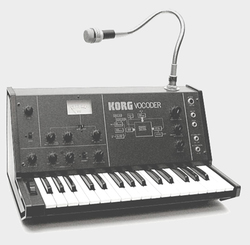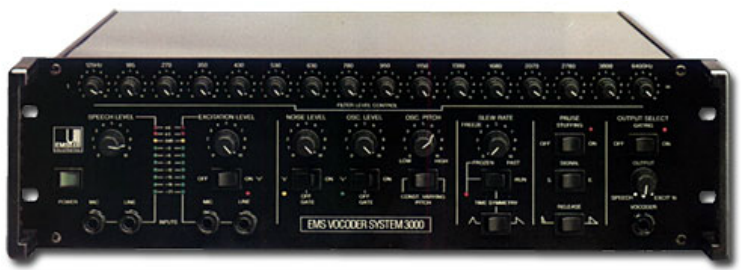
If you have any suggestions that I may have missed please feel free to share in the comments section.
In the past I had owned a vintage Korg VC10 which I really liked and is used on some of my favorite Electro records but can be quite hard to understand clearly the vocal or voice elements. This model in particular sounded great but had limited functionality. To hear an example of it in action check out I-F - Space Invaders are Smoking Grass.
When I decided recently that I would like to buy a new modern Vocoder for the Analog Cabin Recording Studio I jumped head first into some research which I thought may be useful to document here for other robot vocal freaks.
Firstly I thought it might be helpful to provide a bit of background information about the Vocoder as the technology is much older than most studio equipment, let alone audio processors and has an interesting history as it was not developed for music applications at all.
The Vocoder was initially developed as a phone scrambling system for military use.. You can find a technical explaination of how it works below.
A vocoder is an audio processor that captures the characteristic elements of an an audio signal and then uses this characteristic signal to affect other audio signals. The technology behind the vocoder effect was initially used in attempts to synthesize speech. The effect called vocoding can be recognized on records as a "talking synthesizer", made popular by artists such as Stevie Wonder. The basic component extracted during the vocoder analysis is called the formant. The formant describes the fundamental frequency of a sound and its associated noise components.
The vocoder works like this: The input signal (your voice saying "Hello, my name is Fred") is fed into the vocoder's input. This audio signal is sent through a series of parallel signal filters that create a signature of the input signal, based on the frequency content and level of the frequency components. The signal to be processed (a synthesized string sound, for example) is fed into another input on the vocoder. The filter signature created above during the analysis of your voice is used to filter the synthesized sound. The audio output of the vocoder contains the synthesized sound modulated by the filter created by your voice. You hear a synthesized sound that pulses to the tempo of your voice input with the tonal characteristics of your voice added to it.
I highly recommend purchasing the book if it is of interest. You may still be able to pick up a deluxe version that includes a 7 inch with a reissue of some super rare vocoder related boogie, electro funk and early hip hop direct from the publishers website here.
The above video goes into some more detail about the history, early developments and also presents some influential examples of our favorite vocal effect.
One interesting point noted in this video is that one of the most recognizable modern day examples - Planet Rock by Africa Bambatta and the Soul Sonic Force which in fact is not a vocoder at all.
Arthur Baker the engineer for the recording session of Planet Rock points out that (They only had a few things, and so we basically got all of our effects out of the Lexicon PCM41, including Bambaataa's electronic vocal vocoder sound. )
"It wasn't like they had walls of outboard gear and walls of keyboards," Baker remarks. "They only had a few things, and so we basically got all of our effects out of the Lexicon PCM41, including Bambaataa's electronic vocal vocoder sound. That came through a really, really tight delay, almost like a tight electronic phasing, and then there was the state-of-the-art Sony reverb. However, other than that, there weren't a whole load of effects on that record.
There are many Obscure and not so Obscure vintage options available on the second hand market which can fetch big money these days. While I'm not going to suggest for or against going for the vintage models be aware they are getting on in age they will require more care than some of the more modern options.

 RSS Feed
RSS Feed